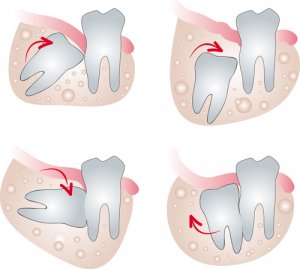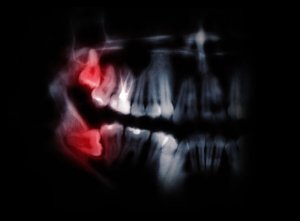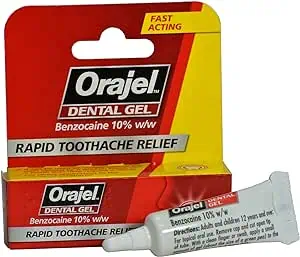Are you looking for wisdom tooth pain relief solutions or wondering how long the pain will last? Wisdom teeth are notorious for the problems and pain they can cause, which is why they are often removed. Even then, it’s normal to experience some pain after extraction, too.
Fortunately, there are various ways to help get rid of wisdom tooth pain in your gum or jaw while a tooth is coming through, or following an extraction.
In this article we explain some of the symptoms and causes, and how to stop wisdom tooth pain if it’s affecting you or someone you know.
Wisdom tooth pain symptoms

Wisdom teeth (or ‘third molars’) are located right at the back of your mouth. Most people have four, but you might have fewer than this or none at all. It’s also possible, although not as common, to have more than four wisdom teeth.
Wisdom teeth cause problems for many people and sometimes have to be removed. You might experience pain from:
- Eruption – A wisdom tooth coming through the gum
- Impaction – When a tooth aligns incorrectly during eruption and ends up pushing against the adjacent tooth
- Decay – This is common in hard-to-reach third molars
- Infection – Caused by partial impaction or untreated dental caries
- Extraction – Pain may continue for a while after a tooth is removed
Whatever symptoms you experience, you should certainly mention any oral pain to your dentist at your next checkup. They will examine your mouth to determine the cause of the pain, and they may take an x-ray to see the position of any unerupted or partially erupted teeth.
If you have any of the signs of impaction or infection mentioned below, the tooth pain is getting worse, or you’re having trouble opening your mouth, you should make a more urgent dental appointment.
If you are in severe pain, are having trouble breathing or eating, or have swelling around your eyes, throat or neck, you should go to A&E rather than waiting to see a dentist.
Pain from a wisdom tooth growing
If none of your wisdom teeth have erupted yet, you might be wondering what wisdom tooth pain feels like. Is that aching at the back of your mouth a cavity or wisdom tooth pain?

It may well be wisdom tooth growing pain if you have any of the following symptoms:
- Pain behind your second molars (right at the back of your mouth)
- Pain in your gum or jaw at the back of your mouth
- Red or swollen gums in the affected area
- A hard bump in your gum or the tip of the tooth visibly emerging
- Headaches, particularly when upper teeth erupt
If a wisdom tooth erupts normally, any pain should be quite mild; perhaps just a dull ache. It’s similar to the teething pain that babies experience. More severe wisdom tooth pain might be a sign of a complication like impaction or infection.
How long does wisdom tooth growing pain last?
Wisdom tooth pain may begin before there are any external signs of the tooth appearing. Then, it can take several weeks or months for a wisdom tooth to fully break through the gum.
It’s common to experience some soreness and sensitivity while the crown of the tooth is erupting especially if you bite down in that area. Once it has pushed through the gum, provided it is not impacted, it should stop hurting.
Some people only experience pain from their wisdom teeth growing for a relatively short time. For others, it may drag out for months or even years. If this is the case for you, you may want to find ways to treat your wisdom tooth pain naturally, since it’s not ideal to keep taking painkillers for a sustained period of time.
It’s also possible for wisdom teeth to never erupt, but to remain quite happily under the gum and never cause any problems to the other teeth. So just because you have unerupted wisdom teeth, it doesn’t necessarily mean you’ll have to deal with wisdom tooth pain at some point.
Impacted wisdom tooth pain

When there isn’t enough room in your jaw for your wisdom teeth to erupt properly, they may grow at an angle and become impacted. Teeth can be full impacted (meaning they are still completely covered by gum) or partially impacted (meaning part of the tooth has emerged).
If the tooth becomes impacted as it is erupting, it may cause pain in the adjacent tooth as it pushes against it. You might also notice that part of the tooth is poking through the gum but it seems to have stopped coming through and is continuing to hurt. Your dentist will need to take an x-ray to check what’s going on beneath the surface.
Even if a wisdom tooth does come through straight, it may put pressure on the other teeth, meaning they gradually become crowded at the front.
Wisdom tooth infection pain
Third molars can easily become infected, either because they haven’t erupted properly or because they are difficult to clean. If you can’t reach right to the back of the tooth to brush and floss it, this can lead to tooth decay, gum disease and eventually a dental infection or abscess.
Pain from a tooth infection is usually severe and you may also have a swollen, painful gum around your wisdom tooth. You might taste or see pus seeping from around the tooth.
Painful wisdom teeth in pregnancy
You might experience heightened problems with your wisdom teeth while pregnant because changes to the hormones in your mouth make it more susceptible to gum disease and infection.
If you’re planning to get pregnant, it’s best to have a dental checkup first so your dentist can check for potential problems that should be dealt with beforehand. Dentists generally avoid carrying out procedures like fillings and teeth extractions during pregnancy, if possible.
If you need extra wisdom tooth pain relief during pregnancy, speak to your dentist or doctor to check what’s safest for you and your baby.
How to stop wisdom tooth pain

If you’re wondering how to get rid of wisdom tooth pain without visiting a dentist, you can try certain home remedies to reduce inflammation and pain. However, if your tooth keeps hurting, it’s best to visit a dentist. They will check what’s causing the pain and what, if anything, needs to be done about it.
The dentist may first administer antibiotics for tooth infection, and painkillers. NHS dentists should only remove a tooth if other options have failed. When it comes to wisdom tooth pain treatment, though, often the best option is to extract the tooth to stop the pain and prevent further infection or other problems.
The following table is an overview of how to relieve wisdom tooth pain according to the source of the pain. Below this, you’ll find more information about various home remedies that can help reduce tooth pain.
Cause of pain | Treatment | Pain relief options |
Wisdom tooth growing | None if it's growing correctly - just wait | Painkillers and other home treatments |
Impaction | Extraction if it's painful or affecting other teeth | Painkillers and other home treatments as an interim measure |
Infection | Anibiotics to fight the infection; extraction as a last resort | Painkillers prescribed by dentist or over-the-counter |
Extraction | Take special care while the wound heals | Painkillers and other home treatments |
Home remedies for wisdom tooth pain relief

Many people find that the best painkiller for wisdom tooth pain relief is ibuprofen, because of its anti-inflammatory properties. Paracetamol can also be effective. It’s safe to take both ibuprofen and paracetamol, up to the maximum dose of each one, if your teeth still hurt after taking one or the other. However, if you’re in this much pain and haven’t seen a dentist yet, you shouldn’t put off making an appointment.
If you have wisdom tooth gum pain, you may get more relief from a topical anaesthetic treatment such as Orajel or Anbesol.
In the helpful video below, Dr Gurs Sehmi describes some wisdom tooth pain symptoms and remedies. He recommends using Corsodyl mouthwash for wisdom tooth gum pain relief – this helps fight the bacteria which cause painful inflammation. He also explains when to see a dentist and what treatment they may carry out.
How to ease wisdom tooth pain naturally
If you prefer to use a natural wisdom tooth pain remedy, clove oil and salt water are both effective.
Cloves have antibacterial, anaesthetic and anti-inflammatory properties. You can apply diluted clove oil directly to the painful area for quick relief. A salt water mouth rinse is also an effective way to kill bacteria and reduce any swelling.
Read more about how to use these and other ways to help wisdom tooth pain at home.
Wisdom tooth extraction pain
The best thing for wisdom tooth pain caused by impaction or infection is often a tooth extraction. If your dentist can see that leaving the tooth in place is likely to cause further problems, they will recommend removing it.
Unfortunately, the pain doesn’t necessarily end there. Extracting third molars can be quite complicated because of the size and position of the teeth, and this often leads to swelling, pain and discomfort following the procedure.
How long does pain after wisdom tooth extraction last?
After your anaesthetic has worn off, the extraction site itself will feel sore for several days. The rate of healing will depend on how large the wound is and whether you have stitches. Your dentist might prescribe you a course of antibiotics to prevent infection, and will either supply painkillers or inform you of the best over-the-counter painkillers for wisdom tooth pain relief.

Here are some tips for minimising pain and reducing the chances of infection in the days after an extraction:
- Rest as much as possible and avoid strenuous exercise
- Don’t touch or poke the wound with your fingers or tongue
- Avoid hot or cold foods and drinks
- Don’t smoke, vape, or drink through a straw (the sucking action can dislodge the blood clot)
- If using mouthwash or salt water to rinse, do so gently
- Brush very carefully around the extraction site
Closely follow your dentist’s advice for protecting the wound and the blood clot that forms inside. If the blood clot becomes dislodged, you’ll experience intense pain from the exposed bone. This condition, known as ‘dry socket‘, requires additional dental care.
Wisdom teeth removal pain doesn’t last forever, but knowing what to expect, and how to prepare, can help with how you handle your post-op period. Following wisdom teeth removal, the gum is normally sore from the time until anaesthetic wears off until around three days later.
However, sometimes the pain can hang on for a couple weeks. If possible, plan to take 1 or 2 days off work or school following surgery. Pain relief medication, like ibuprofen, will help with pain and discomfort. Other home remedies include: creating a warm mouth rinse with one cup of warm water with one tablespoon of salt. Swig and swish the solution around in your mouth for about 30 seconds then spit and repeat; ice the outside of your jaw where the pain is; and avoid sugary or hard foods.
Dr. Robert Berry, Mountain Aire Dentistry
Our guide to the tooth extraction process has more information about what to expect. And we have a separate guide to recovering after having a wisdom tooth removed.
Even after your gum is well on the way to healing, you might continue to experience nerve pain after your wisdom tooth extraction, especially if it was a complicated procedure. It takes time for your body to repair the trauma to your nerves, and it will be several months before your jaw bone has grown to fill in the hole where the tooth roots were.
If you feel like your pain is increasing in the days after an extraction, consult your dentist.
Conclusion
If you are in pain and haven’t visited your dentist yet, it’s best to do so. There are several causes of wisdom tooth pain, some of which require medical intervention.
While you are waiting to see your dentist – or if they have already confirmed the pain is just from a wisdom tooth coming through the gum – the best form of wisdom tooth pain relief is probably ibuprofen, paracetamol, or a topical pain relief medicine. There are also various home remedies you can try; clove oil is one of the most effective.
To ease pain after a wisdom tooth extraction, follow your dentist’s instructions which may include taking painkillers and using a salt water rinse.
NHS: Wisdom Tooth Removal. Consulted 7th May 2019.
Medical News Today: Ways to relieve painful wisdom teeth. Consulted 13th May 2019.




